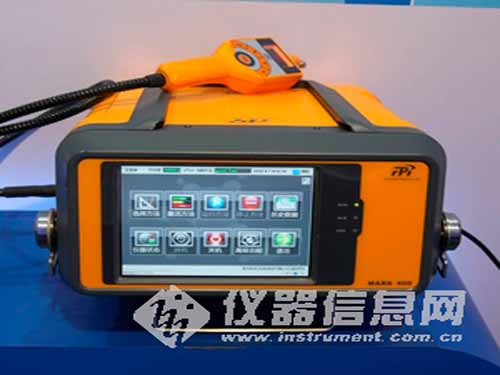 On September 8, 2010, during the "Mexexex 2010", the China Instrument and Control Society Environmental and Safety Testing Instrument Branch held the "Environmental and Safety Inspection Instrumentation Sub-Committee Conference and the Second Academic Forum on Environmental and Safety Inspection Instruments."
On September 8, 2010, during the "Mexexex 2010", the China Instrument and Control Society Environmental and Safety Testing Instrument Branch held the "Environmental and Safety Inspection Instrumentation Sub-Committee Conference and the Second Academic Forum on Environmental and Safety Inspection Instruments." Concentrate Technology, as the main sponsor, took part in the event and released the first domestic portable GC-MS instrument Mars-400 with completely independent intellectual property rights.
Portable Chromatography-Mass Spectrometry (GC-MS) Coupler Mars-400
Concentrated Science and Technology has established the Scientific Instruments Division, and through the introduction of outstanding talents at home and abroad, it has established a powerful research and development team that specializes in the development of high-end analytical instruments. Concentrating technology is one of the earliest companies that have conducted ion trap mass spectrometry research and industrialization of mass spectrometers in China. With the support of relevant national ministries and commissions, and with the help of many senior colleagues in the field of domestic scientific instrumentation and mass spectrometry, After decades of continuous efforts of scientific researchers, the company successfully launched the first portable gas chromatography-mass spectrometry (GC-MS) combination analyzer in China.
As we all know, relying solely on the retention time of gas chromatography technology has been difficult to deal with more and more complex field samples, and mass spectrometry detectors have unique advantages for the characterization of unknowns, so single-chromatography instruments are gradually replaced by gas-mass combinations. Miniaturization is one of the mainstream development directions of mass spectrometry technology. Small-scale mass spectrometry represented by ion trap technology has gradually become a research hotspot in this field. Especially in the past 10 years, the ion trap technology has developed rapidly. Because the ion trap mass analyzer has a tandem mass spectrometry function that can not be achieved by a single quadrupole mass analyzer, the ion trap is more suitable for the quasi-deterministic analysis of unknown compounds. Concentration Technology combines chromatography technology with ion trap mass spectrometry to give full play to the advantages of the former in sample separation, accurate quantification, and the latter in qualitative detection and structural analysis, and has become an indispensable analytical tool in the field of emergency monitoring. Portable GC-MS will move toward faster and lower detection limits in the future, and there will be a qualitative leap in the speed and sensitivity of single-analysis of next-generation products.
Mars-400 can be used for emergency monitoring in many fields such as environmental pollution, disease control center, public security criminal investigation, chemical warfare agents, security counter-terrorism, and food safety rapid inspection. Taking environmental accident emergency monitoring as an example, it can measure volatile/semi-volatile organic compounds in air, water, and soil/solid waste.
Instrument features:
Mars-400 has applied for 5 invention patents and a number of utility models, appearance patents and software copyrights from the beginning of design to the present. In the future, more original intellectual property achievements will be introduced. Compared with similar products in the industry, Mars-400 has the following advantages:
First, excellent portability. With its highly integrated and modular design concept, the Mars-400's main unit is about the same size as a projector and weighs only 14 kilograms. It is a truly portable instrument that can be carried around. Second, qualitative features are prominent. Thanks to the ion trap technology, Mars-400 can easily achieve more than 3 tandem mass spectrometers, so it has good qualitative ability for the more complex environmental samples of the substrate.
Third, the detection limit is low. The patented pulsed internal ion source technology and dynamic adsorption-thermal analysis technology enable the instrument to respond to ppb trace analysis even at trace concentrations, with a dynamic range of more than 4 orders of magnitude.
Fourth, the operation is simple. The Chinese-language software interface and touch-based human-computer interaction approach give field operators an unprecedented sense of control.
Fifth, analysis is fast. The Mars-400's low-capacity-capacity-chromatography technology provides faster warming/cooling than desktop computers, thus shortening the analysis cycle. In addition, under some special conditions, the instrument can work in single mass spectrometry mode, that is, the sample goes directly to the mass spectrometer without the separation of the chromatographic column, enabling faster analysis.
Sixth, maintenance costs are low. Mars-400's main consumables are only carrier gas, and the price is low, so most domestic users can afford it. The ion source uses a dual filament design and the service life is double that of the monofilament. The vacuum system uses an oilless foreline pump and a molecular turbo pump, so there is no loss in this area.